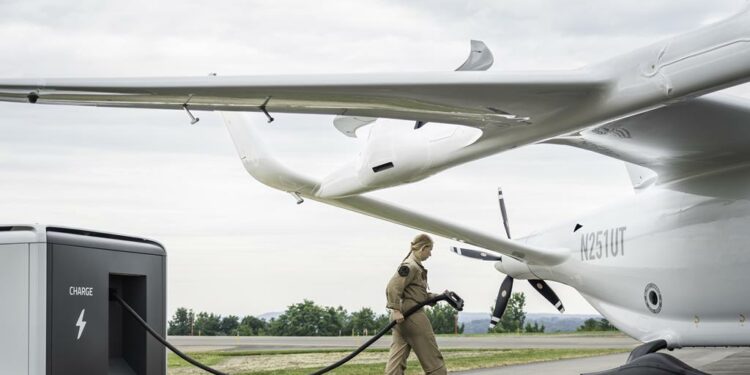Electric aircraft developer Beta Technologies has landed a $20 million contract with the US Department of Health and Human Services (HHS) to boost emergency preparedness in rural eastern US areas.
Vermont-based Beta on 4 September disclosed it won a multi-phase deal with HHS, saying it will develop a pilot programme to ”evaluate next-generation mobility solutions and infrastructure as a means of powering public health preparedness”.
”Through this contract, Beta is installing electric aircraft chargers at locations determined to be important to increasing health care and emergency response along the East and Gulf Coasts,” the company says.
Beta seeks to install 22 charger sites in the region during the life of its HHS contract, in addition to “Charge Cube” stations already online in Alabama, Arkansas, Georgia, Florida and Mississippi.
Such infrastructure is intended to help HHS to deliver patients, organs, equipment and pharmaceuticals with lower-emissions transportation options, with a particular emphasis on connecting under-served rural communities.
”We believe this work has the potential to increase access to health care and essential services for all types of geographies, including the historically harder-to-reach ones,” says Kyle Clark, Beta’s founder and chief executive.
Beta says the maximum range of its in-development fixed-wing electric aircraft – called Alia – will be 336nm (622km), as demonstrated with the start-up’s full-size prototype. It is also developing an electric vertical take-off and landing (eVTOL) variant of Alia.
The proposed charging stations will be compatible not only with the battery-powered Alia but also with electric aircraft produced by other manufacturers and ground-based electric vehicles, the company says.
Along with fellow leading eVTOL developer Archer Aviation, Beta has advocated shared charging infrastructure for electric aircraft by adopting the automotive industry’s Combined Charging Standard.
Another competitor, Joby Aviation, is pushing widespread adoption of an aviation-specific charging system it has been developing for several years. Joby says it intends to make the specifications of its system freely available to other electric aircraft makers.
Beta has previously explored using its Alia aircraft for emergency medical response and critical-cargo missions through its relationship with United Therapeutics, a biotechnology company developing a low-emissions air transportation network to move transplantable organs.
Emergency medical services look to be an increasingly promising field for advanced air mobility (AAM) companies seeking to roll out new propulsion technologies and novel aircraft designs within the next several years. Notably, United Therapeutics struck a deal last month with Robinson Helicopter to develop a future network of “pilot optional” hydrogen helicopters for delivering organs on the east coasts of Canada and the USA.
Beta is pursuing Federal Aviation Administration certification of its fixed-wing Alia as soon as next year, with the eVTOL variant to follow.
Source link : http://www.bing.com/news/apiclick.aspx?ref=FexRss&aid=&tid=66d8bf3f70594c228903c848f393f8c6&url=https%3A%2F%2Fwww.flightglobal.com%2Fairframers%2Fbeta-lands-deal-to-develop-emergency-response-network-in-eastern-usa%2F159844.article&c=9418928751216024147&mkt=en-us
Author :
Publish date : 2024-09-04 08:55:00
Copyright for syndicated content belongs to the linked Source.








